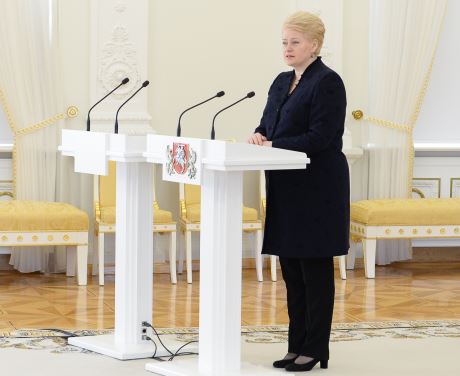Leaders of Lithuania's seven parliamentary parties have underlined their commitment to the construction of the Visaginas nuclear power plant in a document setting out the nation's strategic goals.
 |
| President Dalia Grybauskaitė announces the accord (Image: Lithuanian Presidency) |
The accord, which sets out Lithuania's strategic guidelines for foreign, security and defence policies for the period up to 2020 was signed by representatives of all the parties in the presence of Lithuanian president Dalia Grybauskaitė. In it, they identify energy independence as a key concern for national security and call for the swift implementation of strategic projects to integrate Lithuanian energy infrastructure into the European energy markets.
The Visaginas plant is identified as one of a list of major energy projects, including the construction of a new liquefied natural gas terminal and the completion of power interconnectors with Sweden and Poland.
The Baltic states of Lithuania, Latvia and Estonia together with Poland agreed to build a new nuclear power plant at Visaginas, adjacent to the closed down Ignalina plant, in 2007. Poland subsequently withdrew from the project. In 2011, Hitachi was selected as strategic investor in a project to build a single Hitachi-GE 1350 MWe ABWR at the site, and parliamentary approvals were granted in 2012. However, the project's future has been unclear after a non-binding referendum on nuclear new-build held in conjunction with national elections later that year found 63% of voters opposed to the plan.
The accord reaffirms Lithuania's principle foreign policy goals to reinforce cooperation with the Baltic and Nordic countries, the European Union and the USA. It also states that Russia's recent annexation of the Crimea region of Ukraine is a threat to regional security and stability. Without Visaginas, Lithuania and its Baltic neighbours would remain heavily dependent on Russia to supply its electricity.
Grybauskaitė said the accord was a "clear commitment" that Lithuania's political parties would "strive without reservation" to ensure security and prosperity. "Only working together we will enable faster progress and attain greater prosperity for our people," she said.
Researched and written
by World Nuclear News





_13505.jpg)
_87975.jpg)
_67826.jpg)






